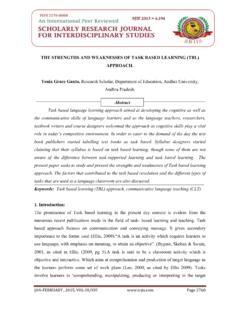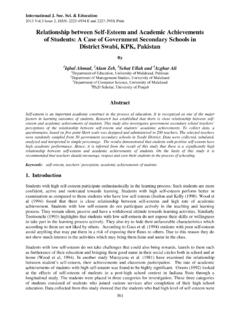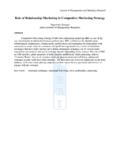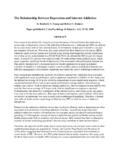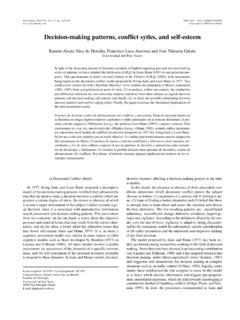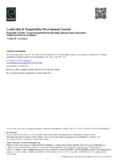Transcription of Self-Concept and Interpersonal Communication
1 The International Journal of Indian Psychology ISSN 2348-5396 (e) | ISSN: 2349-3429 (p) Volume 3, Issue 3, No. 6, DIP: ISBN: 978-1-365-11998-9 | April - June, 2016 2016 I P Samthirao; licensee IJIP. This is an Open Access Research distributed under the terms of the Creative Commons Attribution License ( ), which permits unrestricted use, distribution, and reproduction in any Medium, provided the original work is properly cited. Self-Concept and Interpersonal Communication Prabhakararao Sampthirao1* ABSTRACT One of the main things impacted by our Self-Concept and our self - esteem is our Communication .
2 Self-Concept , self -image, self - esteem and self -efficacy are major factors in the way we communicate. Whether we are introverts or extroverts that can be seen in the way we communicate with others. Communication becomes smooth when we become part of it. People with high self - esteem are confident, responsible, committed to goals, genuine and forgiving. An artificially inflated self - esteem is an effort to appear to have high self - esteem . However, such individuals don't typically show the characteristics of people with high self - esteem .
3 Whereas people with low self - esteem are insecure, unhappy and impatient, but people artificially inflated self - esteem try to appear to have high self - esteem in an effort to compensate their deficiency. There are certain ways improve one s self - esteem . Development of a relationship is closely related to systematic self -disclosure which again another form of Interpersonal Communication . General personality traits such as quietness, shyness, and reticence frequently precipitate Communication Apprehension.
4 Prevention and treatment methods of Communication apprehension are now available. Keywords: Self-Concept , Interpersonal Communication The way we communicate is greatly influenced by our Self-Concept especially self - esteem . Only because of this influence some of us introvert, some others are extroverts and still some others are mixture of both. If somebody focuses on his or her sense of humor in his/her talks, he will be seen as a funny person by all around him whether or not he himself aware of it.
5 Our emotional needs and desires dictate our Communication . If a person perceives himself as an introvert, but he or she doesn t like to be attributed so as it negatively affect his /her self - esteem and he may really want to be a funny person, he reassures himself again and again having a great sense of humor and he goes on to great lengths and breadths to tell jokes and try to amuse others. Before going into the detailed discussion about our own Communication forms, we need to understand certain basic terms and their association with development of our Communication 1 Health Education Officer, Central Health Education Bureau, New Delhi *Responding Author Self-Concept and Interpersonal Communication The International Journal of Indian Psychology, ISSN 2348-5396 (e)| ISSN: 2349-3429 (p) | 178 habits.
6 These are Self-Concept , self -image and self - esteem . Communication become smooth when we become part of it, being a part of it doesn t mean only our physical involvement, but attributes of our , how we see ourselves, what type of feelings and thoughts we hold about our strengths and weaknesses. Relatively what kind of sustained perceptions we hold about ourselves, our emotional states, talents our likes, dislikes values and roles etc., how we want others to see us, how we think others should see us and how we want to see ourselves.
7 All these attributes determine our Communication habits. Most of our Self-Concept is a reflection of our relationships and the people around us. Our parents, near relatives, friends, heroes and bullies, all have influenced the way we perceive ourselves. How does Self-Concept affect our Communication ? Our self -concepts continuously develop and re-develops through constant reflection of our own images through others by variety of processes like looking glass self (1) reflected appraisal, ego boosters and busters; social comparisons (superior/inferior, same /different); cultural teachings and our own interpretations and experiences.
8 Cultural influences on Self-Concept differ greatly from individualistic cultures to collectivistic cultures. In individualistic cultures just like in western cultures, self is separate, unique from other individuals and develops into independent, self -sufficient and without botheration about interdependence and place more emphasis on individual decisions and values, autonomy, youth, change, individual security and equality. These cultures reward and value individual achievements and blame individuals for failures.
9 On the other hand, collectivistic cultures, like in oriental ones promote we orientation and emphasize extended families, their care and in group living. Groups share credit as well as blame and reward contribution to group goals and group decisions, duty, order, tradition, age, group security, status and hierarchy. The five characteristics of Self-Concept are that it affects Communication . It is subjective, resists change, multi-dimensional and flexible. Our relationships with other people mainly affect two areas of our Self-Concept .
10 , our self -image, or characteristics or traits we believe that we possess, and our self - esteem or our evaluation of what is worthwhile or valuable about ourselves. While our self -image is the descriptive side of our Self-Concept , the self - esteem is the evaluative side, which means the side that assigns value and worth to those traits and characteristics. The way in which I perceive myself is my Self-Concept within which my self -image perceives that I am below average handsome and a good writer.



